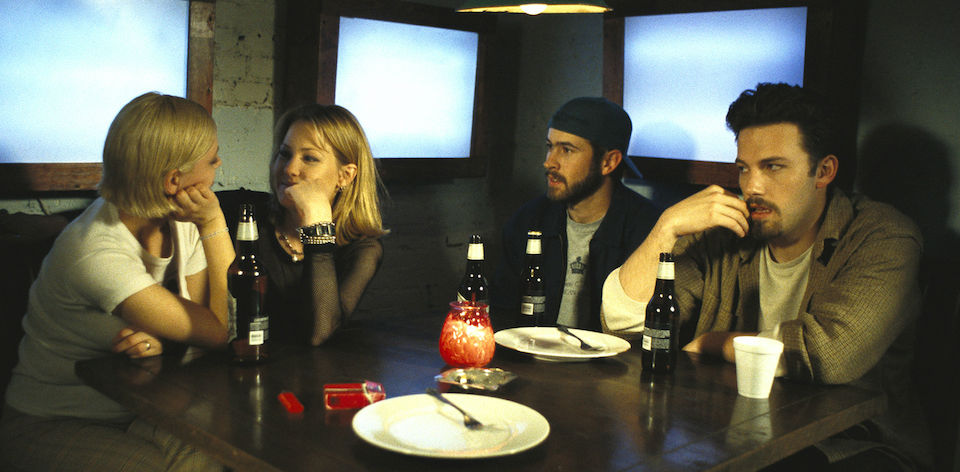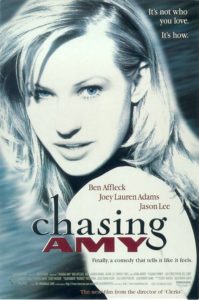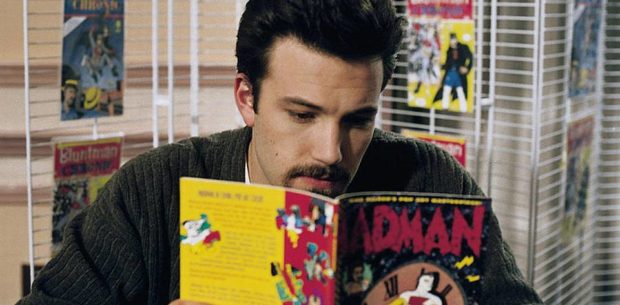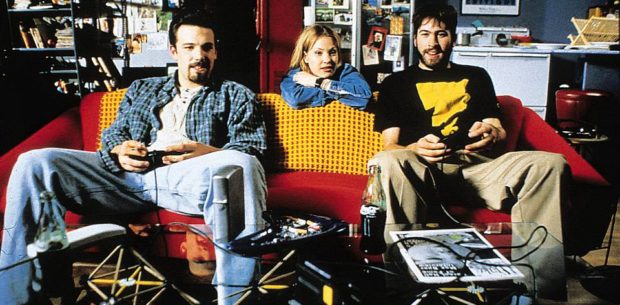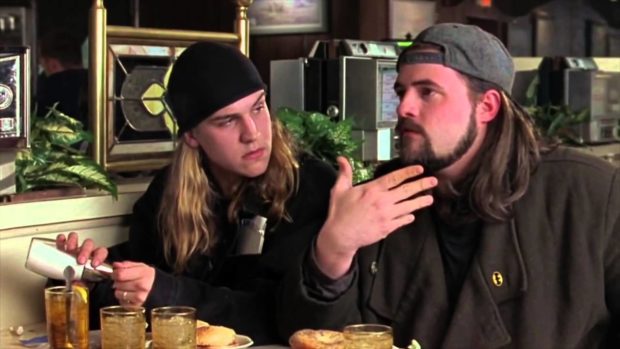“And to the critics who hated our last flick – all is forgiven.” – Kevin Smith, CHASING AMY end credits.
Few filmmakers make quite the stylistic jump that Kevin Smith did with CHASING AMY. Indeed, 20 years ago Smith went into 1997 as the man who had directed the critically maligned, but retrospectively ahead-of-its-time, Mallrats. By the time the year was done, he had earned a whole new level of respect from critics and the film community alike when it has a limited release to the public on 4 April 1997, following a debut at Sundance that year.
The filmmaker made his feature debut three years earlier with Clerks, a black-and-white indie that he’d shot for a little over $27,000. Filled with original characters, cheeky dark humour and witty quotable lines, Clerks would set the tone for Smith’s career, but it certainly wouldn’t define it. Two decades later, Smith has rarely come close to the same achingly real comedy that, in the words of one of the publicity taglines, “tells it like it feels.”
“Looks like a very personal story…”
Towards the end of CHASING AMY the character of Holden (Ben Affleck), sort of a proxy for Smith in the way that Clerks‘ Dante Hicks was also an avatar, admits that he “finally had something personal to say” in his latest comic. Indeed, the title of the film comes from an impassioned speech Smith’s character of Silent Bob gives just before the film’s climax, a virtual recap of his own experiences. “She was the girl, I know that now. But I pushed her away. So, I’ve spent every day since then chasing Amy… so to speak.” It’s one of the moments that Smith talks directly to the audience, a raw admission that his third feature is also his most intimate. Smith and his co-lead Joey Lauren Adams had briefly dated, and in “The How’s and Whys of CHASING AMY” (later adapted into the liner notes for the 2000 Criterion Collection release of the film), Smith says that it “was conceived as a sort of penance/valentine for the woman who made me grow up, more or less—a thank-you homage that marked a major milestone in my life, both personally and professionally.” He adds: “This flick, more than the other two, is me on a slab, laid out for the world to see.”
Smith, exchanging the world of indie filmmaking for indie comics, uses his screenplay to exorcise some personal demons. Setting a film in the world of comic book creators may seem like par for the course today, but in the late 90s fandom had seen it fall into the domain of outsider thrillers like Cellar Dweller (1988), The Ambulance (1990) and Oliver Stone’s The Hand (1981). Instead, Smith’s film comically opens in a sparsely attended comic convention where creators Holden (Ben Affleck) and Banky (Jason Lee) tackle intense fans and accusations of being a “tracer.” Following an excellent series of scenes at the con, including one in which black artist Hooper X (Dwight Ewell) delivers a racially charged dissection of the Star Wars trilogy, we see the genuine and bickeringly close friendship of the creators as they work on their indie hit Bluntman and Chronic. (Behind the scenes, the comic book art was created by the one and only Mike Allred, who also appears as himself signing copies of Madman).
Like all great cinematic partnerships, a love interest threatens their idyllic rut. Fellow comic creator Alyssa (Adams) makes their duo a trio, much to the chagrin of Banky. Holden feels that he and Alyssa have “shared a moment,” but the walls of his carefully constructed fantasy come tumbling down at the realisation Alyssa is gay. After a brief estrangement, Alyssa and Holden become inseparable, exacerbating Holden’s romantic feelings and leading him into a declaration of love. Alyssa reacts against it, but they are soon a hopelessly devoted couple – at least until Banky unearths the sordid details of her heterosexual past. Holden’s inability to deal with this mirrors Smith’s own struggles during his relationship with Adams, and forms the crux of the back half of the film.
“Who the fuck talks like that?”
CHASING AMY was everything that Clerks had promised. Learning from the excesses of Mallrats, Smith’s third film focuses its comedy on the first half of the film, tempering it with the emotional core of the second half. Being the late 1990s, the characters work through their feelings (or perhaps Smith’s inner monologue) through conversation, reflecting the dialogue-heavy Clerks and its frank discussions of sex and sexuality. For every dissection of the relationship between Archie and Jughead, there’s moments where Holden/Banky or Holden/Alyssa are simply sitting and talking.
The film is not without its detractors. The script has been called out by several academics, notably Francesca Gaiba and Suzanna Danuta Walters, for the stereotypical depictions of lesbians in the film. Indeed, our exposure to Alyssa’s circle is limited to nightclubbing, making out, and a group of women drinking red wine. Indeed, the notion that a gay character could be “turned” may be accused of male fantasy, at least if that was the entire extent of Alyssa’s character. Hooper X comes closer to a rounder portrayal in the delicate line he walks between being an angry political-motivated artist to his fans, and the proudly gay side he shows to his friends. Jay and Silent Bob (Jason Mewes and Smith) have more homophobic comments in their brief scene than the entire film put together, with Jay reflecting on Silent Bob’s poignant emotional moment as “gay.”
Yet it’s not so much that the film gets it wrong sometimes, it’s the characters who are yet to work through their own close-mindedness. Banky’s casual homophobia takes the form of gay-bashing his video games and frequently calling Alyssa a “dyke,” and this is partly explained by Smith as an extension of his own closeted feelings for Holden. The latter calls out Banky on this subject, holding him to task for his hate-speech. In another scene, Alyssa asks that Holden’s comments about “real sex” be “stricken from the record. On account of it makes you come off as completely naive and infantile. ” They’re the kind of conversations that regularly play out on social media in the 21st century, and Smith is acknowledging that conversation is the start of the process of overcoming ignorance. Responding to accusations of homophobia for the later Jay and Silent Bob Strike Back, a film that conclusively closes Banky’s arc at least, Smith commented: “I didn’t make jokes at the expense of the gay community. I made jokes at the expense of two characters who neither I nor the audience have ever held up to be paragons of intellect.”
CHASING AMY is not just about sexuality or politics, although it touches on both frequently, but rather about dealing with individual insecurities. Smith is visibly working through his contention that “a partner’s sexual past can ruin an otherwise great relationship,” and in doing confronts prejudiced assumptions each of us might have have about sex, gender and sexuality at various times in our lives.
Still chasing Amy
Modern viewers may have some difficulty in connecting this director to Jay & Silent Bob Strike Back, Cop Out, Yoga Hosers or the outspoken podcaster with his own online network. Yet this Kevin Smith would be clearly felt in passion projects Dogma (1999), the immediate follow-up to this film, and 14 years later in another stylistic departure, Red State (2011). The CW’s raunchy Archie adaptation Riverdale posited that it was Miss Grundy “helping Archie with his homework,” and not Mr. Weatherbee, and we didn’t even have to read between the lines to verify it.
Consciously or not, around the 20th anniversary of CHASING AMY, an episode of TV’s Supergirl went to air (“Distant Sun”), one that partly dealt with a lesbian character’s struggle to deal with her new partner’s past relationships. Written by Gabriel Llanas and Anna Musky-Goldwyn, the episode was directed by none other than Kevin Smith. Maybe he really has been chasing Amy all these years after all.

